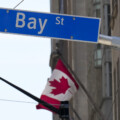The dominant economic story in Canada and other Western economies over the past two decades or so has been what former U.S. Treasury Secretary Larry Summers has termed “secular stagnation.” It refers to a new economic equilibrium in which we’re stuck in something of a “two-percent trap.” The political economy consequences of this sustained period of economic slowdown have been significant.
There may however be good news on the horizon. It’s quite possible that we look back on December 2022 and the release of ChatGPT as the moment that our economies started to get back to higher rates of productivity and economic growth.
Let’s start with the source of the problem. There have been various explanations for the onset of secular stagnation including flat-lined business investment, aging demographics, sluggish productivity, and a lack of technological progress. The relative role of these different factors is the subject of considerable debate. So are our prospects for overcoming them.
Nobel Prize-winning economist Paul Romer is a bit more optimistic than others on this question. He has argued that a key explanation for today’s slow growth is that we haven’t quite yet figured out how to fully realize the economic benefits of the internet and progress in computing across the economy. His main point is that there’s typically a lag between the development of a general-purpose technology and its effects on productivity and economic growth.
In particular, he cites the past research of Stanford University economist Paul David which sought to understand the so-called “productivity paradox”: the strange fact that the modern computer revolution hasn’t expressed itself in productivity gains. David’s analysis finds a historical analogy in the story of electricity and its “diffusion lag” into widespread uses at the turn of the twentieth century.
His key insight is that it takes time to realize the productivity-enhancing applications of general-purpose technologies like electricity or the internet. In the former case, for instance, it took about two decades to start to observe significant productivity gains from the electrification of manufacturing and other industrial processes. The 20-year lag was due to a number of factors including a lack of business knowledge about the nascent technology, the need for accompanying investments in parallel systems (including, for instance, converting manufacturing plants from water or steam to electricity), and the gradual emergence of applications for electrical technologies captured in our statistical measurements.
David concluded from this historical comparison:
[there is] the existence of special difficulties in the commercialization of novel (information) technologies that need to be overcome before the mass of information-users can benefit in their roles as producers, and do so in ways that reflected by our traditional, market-oriented indicators of productivity.
One cannot help but think that ChatGPT is a nascent sign that we’re overcoming these obstacles and finally on the path to reaping the productivity gains of modern computing power. The new, AI-driven prototype understands natural human language and is capable of generating detailed human-like written text based on the reservoir of internet facts and information. It seems poised to finally deliver on the much-anticipated promise of machine learning models.
The potential for this new technology could be significant. Consider that it’s already capable of generating essay responses to exam queries that university professors say would be given full marks if submitted in an undergraduate class. In the medium term, it may replace Google as the primary means by which we leverage the internet’s infinite capacity for human knowledge because of its ability to optimize and synthesize. And, over the long term, as the technology improves, it has the potential to both augment and disrupt a wide range of sectors and professional functions. As The Hub’s executive director Rudyard Griffiths recently wrote: “It’s hard not to come away from using ChatGPT without the sense that this is something big.”
Summers agrees. He’s described ChatGPT and its underlying technology as on par with the printing press and electricity in terms of representing “a profound thing for humanity” with the potential to trigger “a profound change in the way that we are all going to be working.”
There’s already been considerable discussion about its downsides including the risk of widespread labour disruption, the possibilities for politically-motivated censorship, and even that it will make the process of knowledge gathering too efficient.

Yet so much of this commentary fails to reckon with its positive-sum potential. The real story here isn’t its possible negative effects on the economy and society. It’s ChatGPT’s potential to help us extract ourselves from the secular stagnation that has come to manifest itself in stagnate living standards, collective pessimism about the future, and growing political polarization.
Higher rates of productivity and economic growth may not be a cure-all to these problems besetting the modern age but they’re a necessary condition. The practical and scalable usages of artificial intelligence and machine learning have the potential to break Western economies out of the two-percent trap and get back to an age of renewed growth and optimism. The consequences are unpredictable yet undoubtedly exciting.
One high-profile Silicon Valley entrepreneur put it this way: “ChatGPT is one of those rare moments in technology where you see a glimmer of how everything is going to be different going forward.”
Twenty years of disappointing economic performance has contributed to a rise of nostalgia in so much of our culture and politics. Donald Trump’s slogan of “Make America Great Again” is only its most famous expression. ChatGPT represents a way out of its backward-looking, zero-sum grip.
A different future is once again visible. That’s good news for our economy, politics, and society.
Recommended for You

The Notebook by Theo Argitis: Mark Carney’s first major tests

The Weekly Wrap: Trudeau left Canada in terrible fiscal shape—and now Carney’s on clean-up duty

‘Another round of trying to pull capital from Canada’: The Roundtable on Trump’s latest tariff salvo

Falice Chin: The ‘wild and weird’ Calgary Stampede




